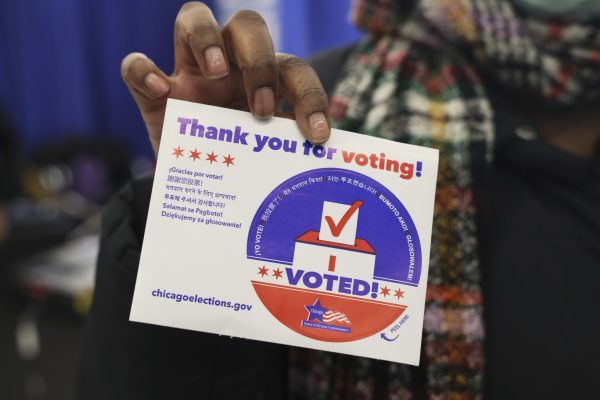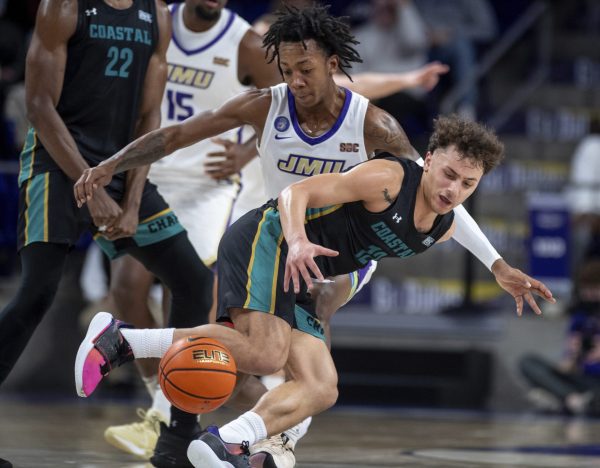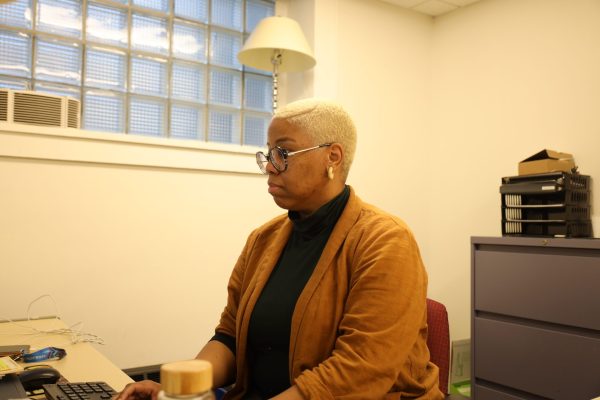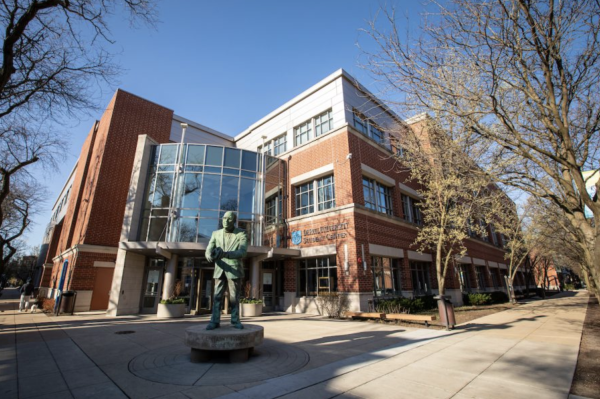SGA accessibility resolution to make remote learning a reasonable accommodation
DePaul faculty went two years without receiving a raise between Jan 2020 and Jan 2022.
Junior Nancy Godinez was hesitant about speaking before DePaul’s Student Government Association (SGA) at their weekly meeting. But as an immunocompromised student, she felt a duty to herself and other disabled students, and decided to take a stand.
“I thought about [attending] the whole day…” she said. “The fact is, I have to advocate for myself.”
Godinez and other disabled students spoke to SGA senators and constituents at the general body meeting on Jan. 27 about making remote learning a permanent accommodation for students who are disabled, chronically ill and immunocompromised.
“I feel a responsibility to advocate for students because I’ve been very fortunate enough to talk with a lot of prospective students and incoming students,” Godinez said.
Shortly after, SGA passed a resolution stating remote learning is a reasonable accessibility accommodation. This comes after the University and the Center of Students for Disabilities (CSD) denied students the option to continue remote learning once in-person classes resumed earlier in the quarter. Disabled students faced financial and academic burdens due to dropping in person classes for their health, The DePaulia previously reported.
The official resolution called for the university to add remote modality for any DePaul class, meeting or event. This would allow for marginalized students, workers and guests to “fully participate remotely.”
David Hupp, chair of the SGA disabled student ad hoc committee, spearheaded the idea for the resolution after disabled students were denied accommodations in January. Shortly after, seven senators became sponsors for the resolution.
“I was really touched that we did manage to get two people to come in and speak at length about how [a lack of remote learning] affected them,” Hupp said.
Sergio Godinez, senator for first-generation students, became a sponsor early on in the process and was able to learn more about how disabled students were living day to day.
“As a person who is not disabled, a lot of us come in with a very ableist point of view,” he said. “After I had reached out to [Hupp], he had sent me some articles. I was reading these students’ experiences and your perspective opens up a lot more in terms of the issues students are facing on campus.”
Nancy Godinez, an immunocompromised, and a disabled constituent spoke about their individual experiences, while Hupp read aloud a piece written anonymously bya disabled student.
“[The senators] initially were concerned about how it would affect other students, before they educated themselves and learned that it wouldn’t affect other students materially and realized that this really is about slowly including a marginalized minority group,” Hupp said.
SGA members were concerned that the execution of this resolution would impact options for non-disabled students.
“There were a lot of logistical concerns regarding how professors would adapt to having a class need to be moved remotely or what is the process of accommodating disabled students on campus,” Sergio Godinez said.
Push for remote learning accommodations
Sergio Godinez said he realized the push for remote learning accommodations would aid not just disabled students, but student parents and caregivers too.
“It’s also benefiting students who are immunocompromised, or students who have families that are immunocompromised, because they’re also put at risk having to go to in-person classes,” he said. “So we realized that this resolution went far beyond the initial scope of the student population that we were looking to benefit from.”
Currently, DePaul is offering in-person, hybrid and virtual options for classes. Not every in-person class has a virtual complement. This includes classes required to graduate.
“I tried really hard this quarter to take a lot of asynchronous classes but because of my major being in the sciences, I have in-person labs and the College of Science and Health is really pushing for in-person classes,” Nancy Godinez said.
DePaul reported 55 on-campus Covid-19 cases from Jan. 29 to Feb 11. Godinez said she received emails from the university notifying that she had been exposed four times this quarter alone.
“Just getting that email that you’ve been exposed to Covid-19 is a horrible, gut-wrenching feeling, because I know if I get sick, even though I am vaccinated and boosted, it still looks very different,” Nancy Godinez said. “It’s something people wouldn’t necessarily know by looking at me, too. A really big plus to having online classes is you never know what students are going through.”
Caryn Chaden, associate provost for student success, and Greg Moorehead, director of CSD, defined an accommodation in a joint statement as, “a change that affects the student who requests/needs it, without significantly affecting the rest of the students in the class.”
Although they said that they “appreciate” SGA’s efforts, Chaden and Moorehead do not think it’s relevant for CSD to recommend which modality is best for different departments.
“The modality by which a course is taught is a decision by the program faculty, the chair and the dean,” Chaden and Moorehead said. “It would be inappropriate for The Center for Students with Disabilities to independently determine how programs offer their courses.”
DePaul received $14 million from the national Coronavirus Aid, Relief and Economic (CARES) act in 2020. These funds supported technological advancements within the university to enable remote instruction.
Chaden and Moorehead alluded to using these funds to make remote learning accommodations in the future.
“With the investment the University has made in new technology for remote synchronous attendance, this is now a possibility,” Chaden and Moorehead said. “We will be happy to work with SGA to explore the possibility of expanding available accommodations for students with recognized need.”
The resolution does not propose shifting entire classes to a remote format, but creating remote options within a class. This could include having a permanent Zoom option. However, this is up to each professor’s discretion, rather than being a university-wide requirement.
Hupp acknowledged that he believed the DePaul administration was sincere about working with SGA and disabled student community.
“We’re nudging them in the direction of the work, making it uncomfortable for them to not do the work, but ultimately, they have to put in the work of figuring out how to actually do this,” he said.
Private universities exemptions under federal law
CSD has a total of nine staff members, yet no position listed for Section 504, a law designed to protect disabled students’ rights at an institution that receives federal funding. Section 504 also prohibits schools from discriminating against disabled students but acknowledges that private universities, like DePaul, “do not have to substantially modify their programs to provide access to students with disabilities.”
It is unclear how much DePaul has to accommodate students as a private institution under Section 504.
DePaul does not list a Section 504 position on the CSD staff page or compliance page. Northwestern University’s director of equal opportunity and access also acts as their Section 504 coordinator. While they handle misconduct reports or grievances, including disability discrimination internally, DePaul outsources their reports with EthicsPoint for students who believe they have been discriminated against.
“The Academic Affairs chain of command does not have the back of disabled students facing discrimination in the form of professors or departments denying them accommodations, including remote learning — and CSD isn’t even part of that chain of command,” Hupp said.
Under DePaul’s organizational chart, all of the deans, associate provosts, associate vice president and vice presidents would report to the provost, Salma Ghanem.
DePaul will continue to offer individualized accommodations for students, but did not indicate how and when further collaboration with SGA about this resolution will occur.
“It’s not easy for students to come forward and especially challenge administration,” Nancy Godinez said. “I’m a huge advocate for going to [resources] because it’s included in our tuition.”
Full list of sponsors: Adora Alava, Mason Decker, Sergio Godinez, Cole Kitchens, Parveen Mundi, Raneem Qassem, and Avery Schoenhals















